Political families, India
(→Political dynasties: the pluses, minuses) |
(→Political dynasties: the pluses, minuses) |
||
| Line 13: | Line 13: | ||
=Political dynasties: the pluses, minuses= | =Political dynasties: the pluses, minuses= | ||
==The main political dynasties of India == | ==The main political dynasties of India == | ||
| − | [[File: 1940s-2019, The main political dynasties of India; Dynastic Congress and BJP MPs, 1999-2019.jpg|1940s-2019: The main political dynasties of India <br/> Dynastic Congress and BJP MPs, 1999-2019 <br/> From: |frame|500px]] | + | [[File: 1940s-2019, The main political dynasties of India; Dynastic Congress and BJP MPs, 1999-2019.jpg|1940s-2019: The main political dynasties of India <br/> Dynastic Congress and BJP MPs, 1999-2019 <br/> From: [https://epaper.timesgroup.com/olive/ODN/TimesOfIndia/shared/ShowArticle.aspx?doc=TOIDEL/2019/05/24&entity=Ar02501&sk=8A4A3815&mode=image May 24, 2019: ''The Times of India'']|frame|500px]] |
| + | |||
See graphic, '1940s-2019: The main political dynasties of India <br/> Dynastic Congress and BJP MPs, 1999-2019 ' | See graphic, '1940s-2019: The main political dynasties of India <br/> Dynastic Congress and BJP MPs, 1999-2019 ' | ||
| Line 49: | Line 50: | ||
POLITICAL FAMILIES, INDIA]] | POLITICAL FAMILIES, INDIA]] | ||
[[Category:Politics|F | [[Category:Politics|F | ||
| + | POLITICAL FAMILIES, INDIA]] | ||
| + | |||
| + | [[Category:India|F POLITICAL FAMILIES, INDIA | ||
| + | POLITICAL FAMILIES, INDIA]] | ||
| + | [[Category:Politics|F POLITICAL FAMILIES, INDIA | ||
POLITICAL FAMILIES, INDIA]] | POLITICAL FAMILIES, INDIA]] | ||
Revision as of 20:25, 27 November 2020
This is a collection of articles archived for the excellence of their content. |
Political dynasties: the pluses, minuses
The main political dynasties of India
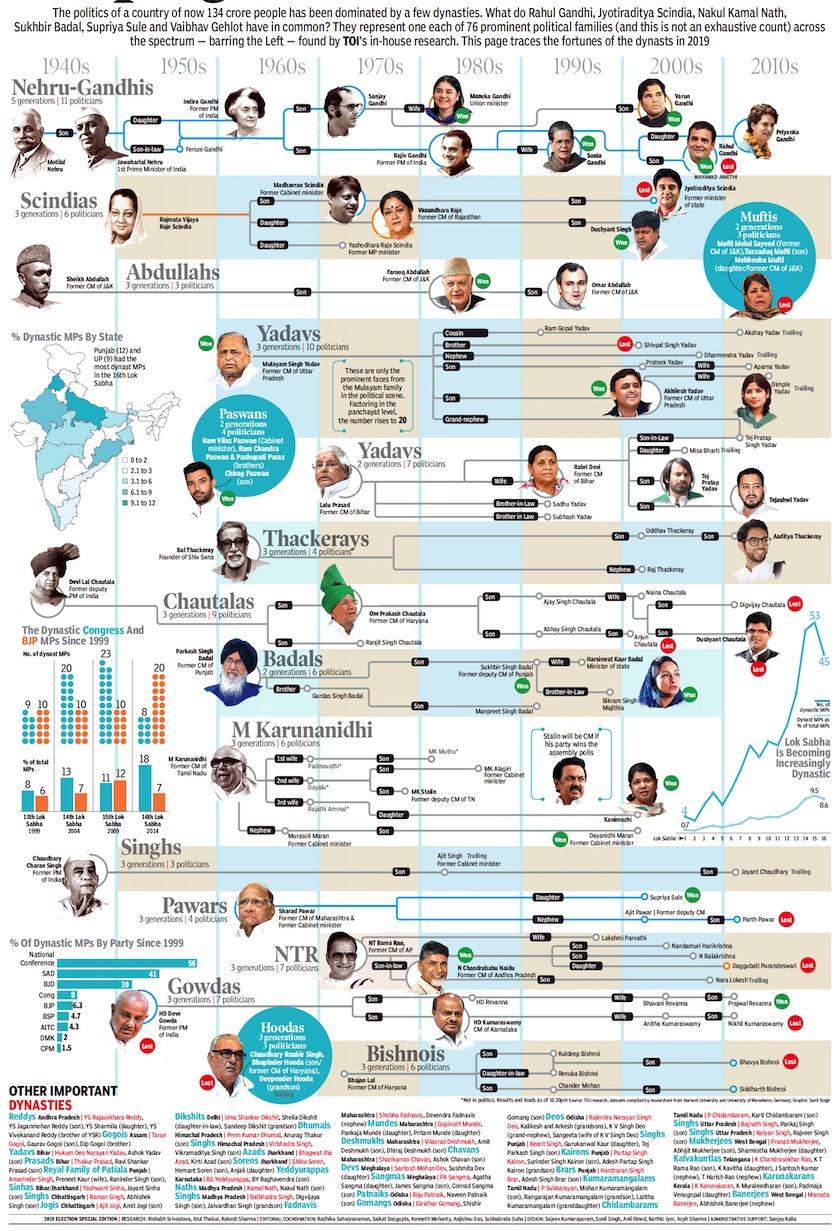
Dynastic Congress and BJP MPs, 1999-2019
From: May 24, 2019: The Times of India
See graphic, '1940s-2019: The main political dynasties of India
Dynastic Congress and BJP MPs, 1999-2019 '
2016: an NYU study

The Times of India, Aug 07 2016
New studies on India's political dynasties busts many assumptions
The Nehru-Gandhis, the Badals, the Abdullahs, the Yadavs, the Scindias -what is it about India's political soil that lets so many family trees thrive?
It's because of a lingering feudalism, say some. It is because of our easy acceptance of hereditary occupations, say others.
But though dynasties in India have been described in history and biography , the phenomenon has never been empirically analysed. A new set of data-driven and theoretically ambitious studies, led by New York University political scientist Kanchan Chandra, is the first to actually study how dynasty and democracy interact. Their book, `Democratic Dynasties: State, Party and Family in Contemporary Indian Politics', has put the skids under much of our popular wisdom.
Dynasty is a paradox, it both hurts and furthers democracy
Dynasties, as we instinctively know, are a violation of political equality because they create entry barriers to outsiders.The data shows that across parties, dynasty logic entrenches forward caste privilege. And yet, they also have collateral benefits that deepen democracy , by opening avenues for women, young people, Muslims and other social groups who don't have an easy way up our given political structures. It is not an ideal route, but dynasties seem to have worked like quotas for the representation of these groups, suggests Chandra.
Party and state set-ups, not feudal charisma encourages dynasties
Indian dynasties are a product of its democracy; former royals and feudal notables account for barely 3% across the last three Lok Sabhas. The Scindias are, in fact, an exception in how they adapted to electoral politics.Voters do not particularly favour dynasts, and they themselves frame their electoral appeals in modern terms, to convey credibility and service rather than entitlement. Also, contrary to popular fears, families do not maintain a tight grip over a constituency; only 5% of parliamentary constituen cies have been continuously represented by a dynastic MP between 2004 and 2014.Dynastic and non-dynastic MPs often switch places in the same constituencies.
So what drives the forming and strengthening of dynasties? Two things, says Chandra -the fact that political office is more attractive than ever before, and the organisational weakness of parties (the lack of clear rules in ticket al location and the assurance of loy alty in sticking with a family member). This is why, even leaders stub bornly resis tant to dynasty like Mamata Banerjee, for instance -can end up allowing it.
Dynasties are pervasive around the world; India isn't unique or extreme
With dynasts occupying 20% of the 2004 Lok Sabha, 30% of the 2009 Lok Sabha and 22% of the 2014 one, India is definitely among the more dynasty-loving nations, but it is in the same league as Japan, Iceland or Ireland, where between a third and a fourth of the legislators had helpful family connections. It is much less dynastic than the Philippines, for instance, where dynasties account for a full 50%. Countries on the lower end are Belgium, Israel, and the US, with 6 to 11%, and Canada where only 3% of the legislators were dynasts. Of course, some nations have institutionalised space for ruling families and aristocrats, like the UK, Sweden, Thailand, Zambia and so on.
Discords/ tiffs within political families
... in 10 political families/ 1911-2015
India Today April 27, 2015
Damayanti Datta
10 political family tiffs that have often turned ugly
A look at slugfests in political families that often turned disturbing
As the Gandhi vs Gandhi clamour hots up in Congress, a look at slugfests in political families that often turned disturbing.
INC President Sonia Gandhi vs son Rahul GandhI
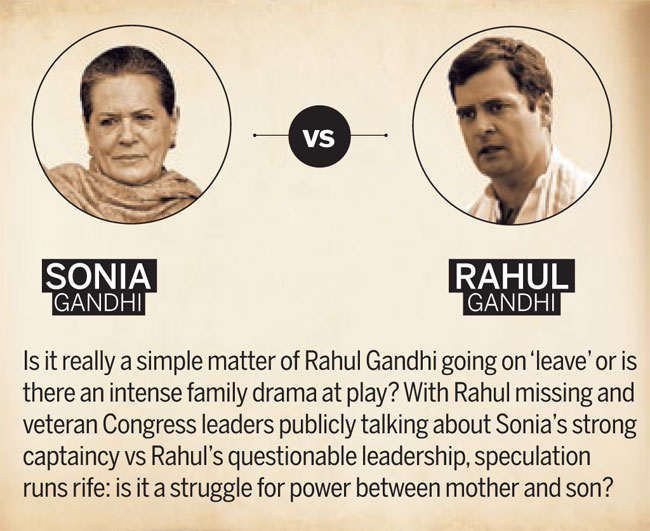
This is about Mr Rahul Gandhi's sudden, unexplained 'leave' of absence in 2015.;
From: Damayanti Datta, April 27, 2015: India Today
See graphic:
Sonia Gandhi vs Rahul Gandhi
This is about Mr Rahul Gandhi's sudden, unexplained 'leave' of absence in 2015.
Mahatma Gandhi vs eldest son Harilal Mohandas Gandhi

From: Damayanti Datta, April 27, 2015: India Today
See graphic:
Mahatma Gandhi vs Harilal Gandhi
Indira Gandhi's husband Feroze Gandhi vs Jawaharlal Nehru

From: Damayanti Datta, April 27, 2015:India Today
See graphic:
Firoz Gandhi vs Pt. Jawaharlal Nehru
Indira Gandhi vs Maneka Gandhi

From: Damayanti Datta, April 27, 2015:India Today
See graphic:
Indira Gandhi vs Maneka Gandhi
Samajwadi Party chief Mulayam Singh Yadav vs son and Uttar Pradesh CM Akhilesh Yadav
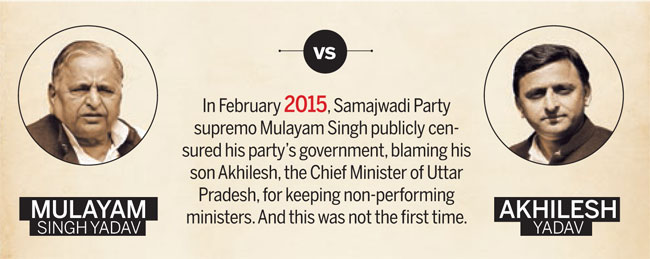
From: Damayanti Datta, April 27, 2015:India Today
See graphic
Mulayam Singh Yadav vs Akhilesh Yadav
See also Samajwadi Party
Former PM H.D. Deve Gowda vs younger son H.D. Kumaraswamy

From: Damayanti Datta, April 27, 2015:India Today
See graphic:
Former Prime Minister of India- Haradanahalli Doddegowda Deve Gowda (H. D. Deve Gowda)
Madhavrao Scindia vs mother Vijayaraje Scindia

From: Damayanti Datta, April 27, 2015: India Today
See graphic:
Scindia family
Shiv Sena founder Balasaheb Thackeray vs nephew Raj Thackeray

From: Damayanti Datta, April 27, 2015:India Today
See graphic
Thackeray family
DMK chief M. Karunanidhi vs elder son M.K. Alagiri
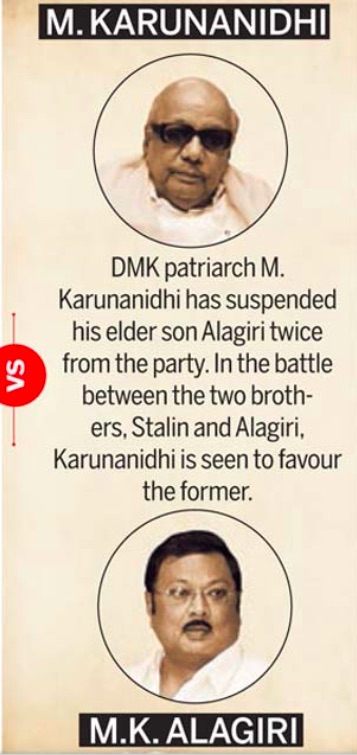
From: Damayanti Datta, April 27, 2015: India Today
See graphic
DMK family
Leader of the People's Party of Punjab, Manpreet Singh Badal vs uncle Parkash Singh Badal
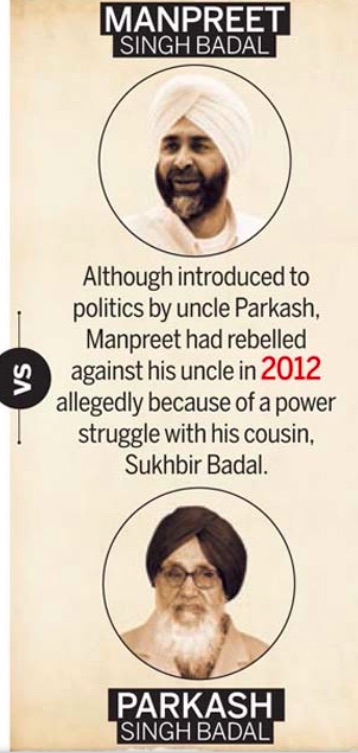
From: Damayanti Datta, April 27, 2015: India Today
See graphic:
Badal family
Maharashtra: transition and impatient scions/ 1960s-2019
GenNext's clamour for power and unwillingness to wait for it have resulted in some of Maharashtra's key political families resembling precarious houses of cards as the decks are cleared for the Lok Sabha elections.
The done thing in dynastic politics has always been for youngsters to spend some time learning the ropes in the background or on the sidelines, often in the shadow of the patriarchs. Even if ideologically, compartments ceased to be watertight decades ago, with the Pawar family of Baramati and the Vikhe Patils of Ahmednagar too going off in more than one direction, the core value of gradually climbing up the ladder was not under threat. Now suddenly it is, as a result of overarching ambition and a now-or-never attitude.
And the Pawar and Vikhe Patil dynasties are among the first to have been at the receiving end this poll season. Sharad Pawar initially made it clear he and daughter Supriya Sule would be the only two members of the family contesting the LS polls. But his nephew Ajit's son Parth pressed on, claiming the Maval seat + for himself, until Pawar Sr deftly resolved the issue and gave Parth the go-ahead while withdrawing from the fray himself. And when leader of opposition Radhakrishna Vikhe Patil of Congress failed in his attempts to wrest the Ahmednagar LS seat from NCP in his son Sujay's favour, Sujay quickly joined the BJP + .
Supriya Sule denied on Wednesday that the Parth episode had created a rift in the Pawar family. "For me and Ajitdada, family ties are of greater importance than anything else. Blood is thicker than the elixir of politics," she said.
However, some seniors are confused and distraught. "Everything is moving at a frenetic pace. A young politician wants to make it big in too short a span of time by using the family name," a senior NCP functionary said. "A young scion had to spend a couple of years by the side of the patriarch before graduating to bigger opportunities. A panchayat samiti or zilla parishad membership was the first step of the ladder," the functionary said.
The transition of power and political legacy was smooth in many political families in the 1960s, such as the Hireys of Nashik, the Vartaks of Virar, the Vikhe Patils, the Pawars, and the Chavans of Nanded. The Thackeray clan of Mumbai was the first to face open revolt by one of its young members, Raj Thackeray.
Interestingly, the number of Maharashtra leaders who showed no great interest in pushing their kith and kin into politics was impressive. Among them were Congressmen like Yashwantrao Chavan, Vasantdada Patil (his son briefly dabbled in politics before fading into oblivion) and Vasantrao Naik, and opposition stalwarts such as S M Joshi, N G Goray, George Fernandes and Mrinal Gore.
Those who were keen on handing over political legacy to their children took care to groom them. NCP veterans spoke about how Pawar Sr put his daughter through the paces when she decided to join the family vocation. Sule, now an NCP leader, said, "My father made me go from one Mantralaya department to the other with files to study the mechanism of the state administration when I took up the issue of women's empowerment. Being a member of a political family means more hard work."
Gopinath Munde would make daughter Pankaja sit next to him during media interviews or while studying papers of a complicated development issue, it is said.
The political climate began to undergo a change after Raj Thackeray's revolt against Matoshree, making Maharashtra's netas aware of GenNext's stirrings.
Even today, however, many upcoming scions are eager to hone their political skills, among them Yuva Sena chief Aditya Thackeray, Amit Thackeray, son of MNS chief Raj Thackeray and Narayan Rane's son Nitesh.
Then there are those like Milind Deora, Praniti Shinde and Amit Deshmukh of the Congress and Poonam Mahajan of the BJP who have succeeded in good measure in stepping out of their father's shadow. "But some refuse to be low-profile. An expensive lifestyle and vanity may lead to a disconnect between young politicians and grassroot workers of a party," said a political commentator.
While Sule's view is that the young generation should be encouraged to join politics, she thinks they should put their shoulder to the wheel. "They can't keep flaunting their family card," she said.
Amit Thackeray feels gone are the days when members of a political clan could "bask in borrowed glory". "Nothing wrong if a politician's son or daughter joins their father. But they will have to prove their credentials by bonding with people and not just by hankering after an MP seat or ministerial post," he said.
1984-2016: disagreements within families
NETA FAMILY FEUDS, Oct 25 2016 : The Times of India
Yadavs are the latest in the list of political families facing a split as generations clash over way ahead for the party & roles they play
AIADMK
I n 1984, when MG Ramachandran was incapacitated after a stroke, Jayalalithaa reportedly tried to take over the position of CM. After MGR's death in Dec 1987, AIADMK split into two factions between Janaki (MGR's wife) and Jayalalithaa.Following AIADMK's rout in the 1989 state polls, the faction led by Janaki merged under that led by Jayalalithaa
TDP
In 1995, Chandrababu Naidu staged a coup against party founder NT Rama Rao, replacing him as Andhra's CM. Naidu would later say a “dushta shakti“ (referring to NTR's second wife Lakshmi Parvati) tried to destroy the party and to protect it from the “evil force“ he had to revolt and split TDP. Members of the NTR family supported Naidu. After NTR died of a heart attack in Jan 1996, Parvati floated a rival faction TDP NTR. Both Naidu and she staked claim to NTR's legacy
DMK
Hints from party supremo Karunanidhi that his younger son MK Stalin was to be his political heir sparked tension in the DMK first family as MK Alagiri, Stalin's elder brother, openly vented his ire and accused his father of being “partial“ to his younger brother.
Alagiri was eventually expelled from DMK in 2014 for engaging in “anti party“ activities
Shiv Sena
Raj Thackeray resigned from his uncle Bal Thackeray's party in 2006 and went on to form the Maharashtra Navnirman Sena. He had complained about being sidelined in the party and said “all I had asked for was respect (from `Matoshree', the Bandra residence of Thackeray and his son, Uddhav).All I got was insult and humiliation“